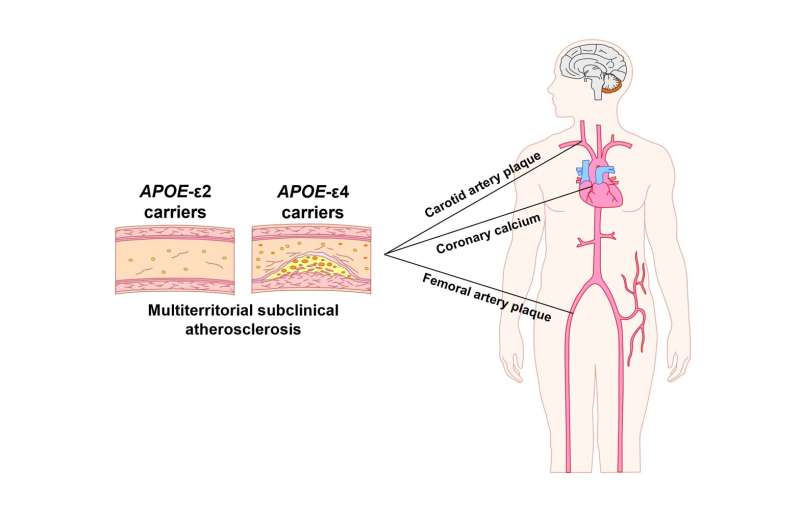This article has been reviewed according to Science X's editorial process and policies. Editors have highlighted the following attributes while ensuring the content's credibility:
fact-checked
peer-reviewed publication
proofread
APOE genetic variants linked to Alzheimer's disease also associated with the development of subclinical atherosclerosis

Scientists at the Centro Nacional de Investigaciones Cardiovasculares (CNIC) in Madrid have found that one of the most potent genetic risk factors for Alzheimer's disease, apolipoprotein E4 (APOE4), is also associated with an increased risk of developing subclinical atherosclerosis in middle age. The study also demonstrates protection against subclinical atherosclerosis in people carrying the variant APOE2, which protects against Alzheimer's disease.
The study, coordinated by Dr. Marta Cortés Canteli and CNIC General Director Dr. Valentín Fuster, sheds light on the role of APOE in the development of cardiovascular diseases and has important implications for treatment and prevention, especially in the first half of adult life. The work is published in Circulation Research.
The APOE gene encodes apolipoprotein E, which—among other important functions—contributes to the transport of lipids in the blood. There are three main APOE alleles, which give rise to three apolipoprotein isoforms: APOE2, APOE3, and APOE4.
"Inheriting one or other of these alleles confers a different risk of developing distinct diseases, among them cardiovascular disease and Alzheimer's disease," explained Dr. Cortés Canteli, a neuroscientist at the CNIC and a Miguel Servet fellow at the Fundación Jiménez Díaz University Hospital Health Research Institute.
People who inherit APOE4 have an elevated risk of atherosclerosis due to high levels of circulating cholesterol. In contrast, those who inherit APOE2 have lower cholesterol and a lower prevalence of atherosclerosis.
The mechanisms underlying these associations are complex, and the influence of age, sex, and other cardiovascular risk factors has remained unclear, especially in the initial phases of disease development.
The PESA-CNIC-Santander study
In the new study, the CNIC team demonstrates that APOE4 carriers among the middle-aged participants in the PESA-CNIC-Santander study (aged 40–54 years) have elevated levels of circulating LDL cholesterol ("bad" cholesterol), which increases their risk of developing subclinical atherosclerosis. This finding provides a window of opportunity for implementing early intervention strategies.
The study also shows that carriers of the APOE2 variant have comparatively less subclinical atherosclerosis in the carotid, femoral, and coronary arteries. This protection is due to these individuals having normal levels of triglycerides, or in the case of women and individuals in the youngest age category (40–44 years), comparatively low levels of circulating LDL cholesterol. "These findings underline, once more, the importance of a healthy lifestyle," said Dr. Fuster, who combines his role at the CNIC with those of President of the Cardiovascular Institute and Physician-in-Chief at Mount Sinai Medical Center in New York.
Among men and in the older general study population participants (aged 45–54 years), the protective effect of APOE2 appeared to require some additional mechanism. APOE2 carriers showed enrichment in molecular pathways associated with anti-inflammatory processes and a reduced activity of genes involved in coagulation and complement-cascade activation. As co-first author Dr. Raquel Toribio Fernández explained, "These findings suggest that modulation of the immune system contributes to the protection against the early development of atherosclerosis in APOE2 carriers."
Co-first author Dr. Catarina Tristão Pereira commented that "the results indicate that knowledge of which APOE isoform an individual has could improve the stratification of cardiovascular risk, especially during the initial phases of the development of cardiovascular disease."
The PESA-CNIC-Santander study, directed by Dr. Fuster, is a prospective study of more than 4,000 asymptomatic middle-aged participants who have been periodically examined with advanced imaging technologies since 2010 to screen for the presence and development of subclinical atherosclerosis.
More information: Apolipoprotein E-ε2 and resistance to atherosclerosis in midlife: the PESA observational study, Circulation Research (2024). www.ahajournals.org/doi/abs/10 … CRESAHA.123.323921R1





















